下学期unit12
人教版七年级英语下册unit12优秀教案

人教版七年级英语下册unit12优秀教案全文共3篇示例,供读者参考篇1Unit 12 of the People's Education Edition Grade Seven English textbook covers the topic of art and creativity. In this unit, students will learn about different forms of art, discuss their favorite types of art, and participate in various creative activities to express themselves.To make the most of this unit, here is an excellent lesson plan that teachers can follow:Lesson 1: Introduction to ArtObjective: To introduce students to the concept of art and its different forms.Activities:1. Show examples of different types of art such as paintings, sculptures, and music.2. Brainstorm with students about what art means to them and what forms of art they enjoy.3. Discuss the importance of art in society and how it can bea form of self-expression.Lesson 2: Famous ArtistsObjective: To learn about famous artists and their works.Activities:1. Introduce students to well-known artists such as Leonardo da Vinci, Vincent van Gogh, and Pablo Picasso.2. Show pictures of their famous works and discuss the style and themes of their art.3. Have students choose a favorite artist and create a poster about their life and works.Lesson 3: Creating ArtObjective: To engage students in creative activities to express themselves.Activities:1. Provide art supplies such as paints, crayons, and paper for students to use.2. Encourage students to create their own artwork inspired by the styles of famous artists or their own imagination.3. Have a mini art exhibition in the classroom to showcase students' works.Lesson 4: Reflecting on ArtObjective: To reflect on the role of art in our lives and society.Activities:1. Have a class discussion about how art can inspire, entertain, and provoke emotions.2. Ask students to write a reflection on what art means to them and how they can incorporate more art into their lives.3. Watch a short video about the impact of art on society and discuss its importance.By following this lesson plan, teachers can effectively cover the content of Unit 12 and engage students in meaningful discussions and activities related to art and creativity. This will not only help students improve their English skills but also develop their appreciation for art and the creative process.篇2Unit 12 of the People's Education Press seventh grade English textbook is focused on the theme of "Life in the future".In this unit, students will learn how to talk about their future plans, aspirations, and predictions. Here is an excellent lesson plan for teaching Unit 12 of the textbook:Lesson Plan:Title: Life in the futureGrade: 7Unit: 12 (People's Education Press)Theme: Future plans, aspirations, and predictionsDuration: 2 lessons (90 minutes each)Objectives:- Students will be able to talk about their future plans using the simple future tense.- Students will be able to express their aspirations for the future.- Students will be able to make predictions about the future using future tense modal verbs.- Students will be able to write a short paragraph describing their future plans.Warm-up (15 minutes):- Begin the lesson by asking students to brainstorm and discuss what they think life will be like in the future. Encourage them to think about technology, education, careers, and daily life.- Play a short video or show pictures of futuristic inventions and ask students to describe what they see.Presentation (30 minutes):- Introduce the simple future tense to students and explain its formation (will + base verb).- Give examples of how to talk about future plans using the simple future tense.- Practice with students by asking them to talk about their own future plans using the simple future tense.- Introduce future tense modal verbs (will, might, may) for making predictions about the future.- Give examples of how to make predictions using future tense modal verbs.Practice (30 minutes):- Divide students into pairs and ask them to discuss and write down their future plans using the simple future tense.- Monitor and provide assistance as needed.- Ask some pairs to share their plans with the class.Production (15 minutes):- Ask students to write a short paragraph (5-7 sentences) describing their future plans using the simple future tense.- Provide a writing prompt to help guide students in their writing.- Allow students to share their paragraphs with the class.Review and Assessment (15 minutes):- Review key concepts and vocabulary from the lesson.- Ask students to complete a short quiz or worksheet to assess their understanding of the simple future tense and future tense modal verbs.- Provide feedback and address any misconceptions.Homework:- Assign students to write a diary entry about a day in their future life using the simple future tense.By following this lesson plan, students will be able to effectively communicate their future plans, aspirations, andpredictions in English. This lesson plan incorporates various activities to engage students and reinforce key language concepts related to the theme of "Life in the future" in Unit 12 of the People's Education Press seventh grade English textbook.篇3Unit 12: You’re supposed to shake handsTeaching Objectives:1. Students will be able to understand the cultural differences in greetings between different countries.2. Students will be able to use the target language for greetings appropriately.3. Students will be able to reflect on the importance of cultural understanding and respect.Teaching Procedures:Step 1: Warm-up (10 minutes)- Begin the class by showing a video clip of people from different cultures greeting each other. Ask the students to share their thoughts on the various greetings they saw.- Discuss the importance of greetings in different cultures and how they can vary from country to country.Step 2: Presentation (15 minutes)- Introduce the target language for greetings and practice pronunciation with the students.- Show a slideshow or video presentation of common greetings in different countries, emphasizing the cultural significance of each greeting.- Have students take notes on the different greetings and their cultural meanings.Step 3: Practice (20 minutes)- Divide the class into pairs or small groups and have them practice the target language greetings with each other.- Encourage students to think about the appropriate greetings for different situations (formal vs. informal, meeting strangers vs. meeting friends).- Monitor and provide feedback as needed.Step 4: Cultural Understanding (15 minutes)- Engage the students in a discussion about the importance of cultural understanding and respect when greeting others.- Ask students to reflect on a time when they may have misunderstood a greeting in a different culture and how they could have handled the situation better.- Encourage students to think about ways they can show respect for other cultures in their daily lives.Step 5: Review and Assessment (10 minutes)- Review the target language greetings with the whole class and assess student understanding through a quick quiz or game.- Encourage students to continue practicing their greetings outside of the classroom and to explore more about different cultures and their greetings.Homework:- Ask students to research a different culture and its traditional greetings, and to write a short reflection on what they learned.By following this detailed lesson plan, students will not only learn the target language for greetings but also gain a deeperunderstanding of the importance of cultural awareness and respect.。
七年级英语下册重点短语:Unit12

Unit 12 Don’t eat in class. ⼀、词组 school rules 学校规章制度 break the rules 违反规章制度 in the hallways 在过道 listen to music 听⾳乐 in the music room 在⾳乐教室⾥ in the dining hall 在餐厅 sports shoes 运动鞋 gym class 体育课 after school 放学后 have to do 不得不做 too many 太多 get up 起床 by ten o’clock ⼗点之前 make dinner 做饭 the children’s palace 少年宫 ⼆、句型 (1)—Don’t arrive late for class. (2)—We can’t listen to music in the hallways,but we can listen to it outside. (3)—What else do you have to do? -- We have to clean the classroom. (4)--Can we wear hats in school? --Yes,we can/ No,we can’t. (5)-Do you have to wear a uniform at school? -Yes,we do /No,we don’t. 重难点精析 祈使句 通常⽤来表⽰命令、请求、禁⽌、建议、警告等语⽓。
它的主语you(听话⼈)通常省略。
其构成通常有以下⼏种形式。
1)Be型(即系动词原型be+表语+其他)。
如:Be quiet,please. 否定句Don’t + be+表语+其他。
如:Don’t be angry. 2)Do型(即系动词原形+宾语+其他)。
如: Open you books,please. 否定句Don’t +实义动词原形+宾语+其他。
人教版七年级英语下册Unit12复习教案
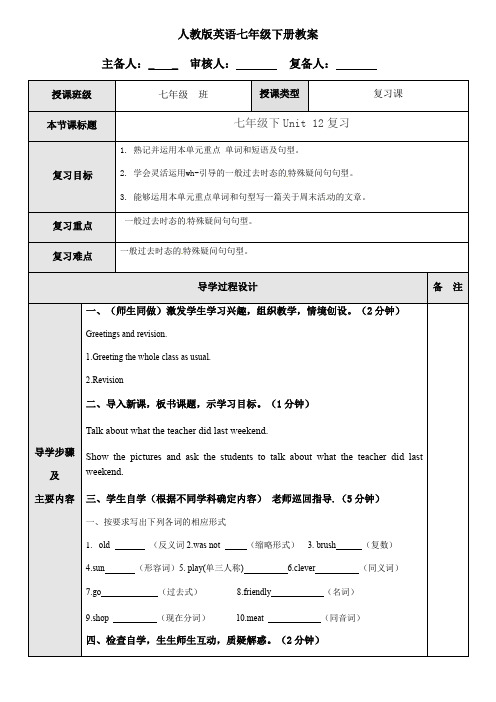
人教版英语七年级下册教案主备人:_ _ 审核人:复备人:1. 熟记并运用本单元重点单词和短语及句型。
2. 学会灵活运用wh-引导的一般过去时态的特殊疑问句句型。
3. 能够运用本单元重点单词和句型写一篇关于周末活动的文章。
一般过去时态的特殊疑问句句型。
一般过去时态的特殊疑问句句型。
默写下列短语1 深夜不睡;熬夜__________ 2去看电影___________3 去划船________4 在湖边野营________5 去海滩__________6 打羽毛球__________7 备考数学测验____________ 8 在星期六上午________9 以...的身份工作_________ 10 生活习惯__________11 跑开_____________ 12 冲...大声叫嚷_________13 爬到....上面___________14 弄丢东西_________15 上个周末____________16看望她的祖母_______17 和....一起去___________18 老鼠一家________19 弹吉它_____________20 去图书馆________21 和朋友吃晚饭_________22 放风筝________23 待在家里________24 玩得开心________25 待在家里____________ 26 中学__________27 搭起,举起___________28 互相;彼此______29 吃惊_________ 30 上上下下,起伏______31 把...弄醒___________32 对....大声喊叫_______五、讲授新课,师精讲,生精练。
(10分钟)1. shout at ... 冲...大声叫嚷区别:shout at与shout to: shout at:近距离喊叫,带有训斥之意。
shout to:远距离喊叫,告知提醒某人。
eg:Don't shout at me. 别冲我大喊大叫。
人教版七年级英语下册Unit 12单词表附音标
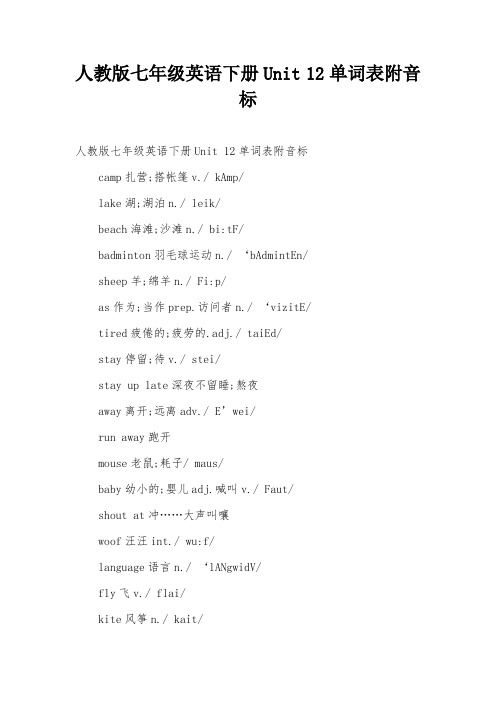
人教版七年级英语下册Unit 12单词表附音
标
人教版七年级英语下册Unit 12单词表附音标
camp扎营;搭帐篷v./ kAmp/
lake湖;湖泊n./ leik/
beach海滩;沙滩n./ bi:tF/
badminton羽毛球运动n./ ‘bAdmintEn/
sheep羊;绵羊n./ Fi:p/
as作为;当作prep.访问者n./ ‘vizitE/
tired疲倦的;疲劳的.adj./ taiEd/
stay停留;待v./ stei/
stay up late深夜不留睡;熬夜
away离开;远离adv./ E’wei/
run away跑开
mouse老鼠;耗子/ maus/
baby幼小的;婴儿adj.喊叫v./ Faut/
shout at冲……大声叫嚷
woof汪汪int./ wu:f/
language语言n./ ‘lANgwidV/
fly飞v./ flai/
kite风筝n./ kait/
fiy a kite放风筝
high高的adj.举起
moon月亮n./ mu:n/
surprise惊奇;惊讶;使吃惊n.吓坏了的adj. move移动v./ mu:v/
shout to对……大声喊叫
start开始;着手v./ stB:t/
jump跳;跃v./ dVQmp/
up and down上上下下;起伏
wake 弄醒;醒v./ weik/
wake…up把……弄醒
into到……里面;进入prep./ ‘intu:/
forest森林n./ ‘fRrist/
ear耳朵n./ iE/。
人教版英语七年级下册单元Unit 12 知识点+测试卷+思维导图

Unit 12 What did you do last weekend?1.重点词汇:lake, beach, sheep, kite, moon, snake, forest, surprise, pretty, natural, shout, fly, stay, move, jump, wake2. 短语归纳:1.work as 以……身份而工作2.have a good weekend 周末过得愉快3.kind of 有点儿4.stay up late 熬夜5.run away 跑开6.shout at 对……大声叫嚷7.put up 搭起,举起8.in the countryside 在乡下9.get a surprise 吃惊10.make a fire 生火11.each other 互相12.so… that… 如此……以至于……13.look out of… 向……外看14.up and down 上上下下15.wake…up 把……弄醒16.move into… 移进……3. 必背典句:1. —What did you do last weekend? 上个周末你做什么了?—I did my homework. / We went boating. 我做了我的家庭作业。
/我们去划船了。
2. —Who visited her grandma? 谁看望了她的奶奶?—Becky did. 贝姬看望了。
3. My sister finished high school two weeks ago. 我的姐姐两周前中学毕业了。
4. But I was so tired that I went to sleep early. 但是我是如此疲倦,以至于我很早就睡着了。
4.语法知识:1. 一般过去时的几种句型:(1)be动词的一般过去时的句型:①肯定句结构为:主语+was / were+其它。
人教版七年级英语下册单元知识归纳Unit12.doc
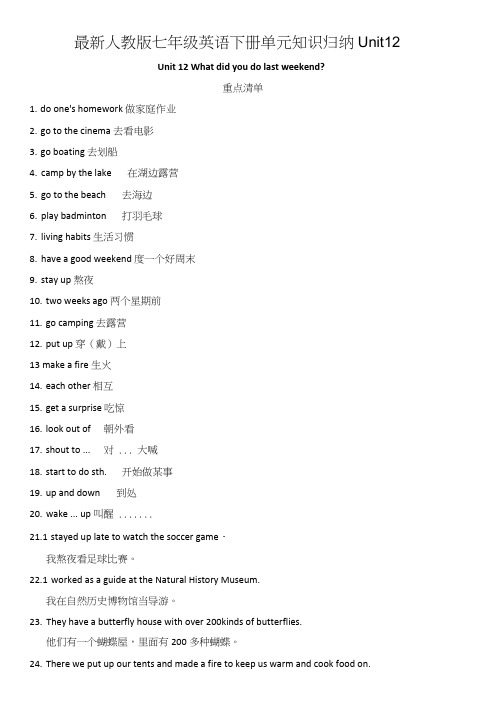
最新人教版七年级英语下册单元知识归纳Unit12Unit 12 What did you do last weekend?重点清单1.do one's homework 做家庭作业2.go to the cinema 去看电影3.go boating 去划船4.camp by the lake 在湖边露营5.go to the beach 去海边6.play badminton 打羽毛球7.living habits 生活习惯8.have a good weekend 度一个好周末9.stay up 熬夜10.two weeks ago 两个星期前11.go camping 去露营12.put up 穿(戴)上13 make a fire 生火14.each other 相互15.get a surprise 吃惊16.look out of 朝外看17.shout to ... 对 ... 大喊18.start to do sth. 开始做某事19.up and down 到处20.wake ... up 叫醒 .......21.1stayed up late to watch the soccer game・我熬夜看足球比赛。
22.1worked as a guide at the Natural History Museum.我在自然历史博物馆当导游。
23.They have a butterfly house with over 200kinds of butterflies.他们有一个蝴蝶屋,里面有200多种蝴蝶。
24.There we put up our tents and made a fire to keep us warm and cook food on.在那我们支起一个帐篷,并生火取暖,在火上烹饪食物。
25.1was so tired that I went to sleep early.我太累了,因此很早就去睡觉了。
人教版英语七年级下册Unit 12 单元复习
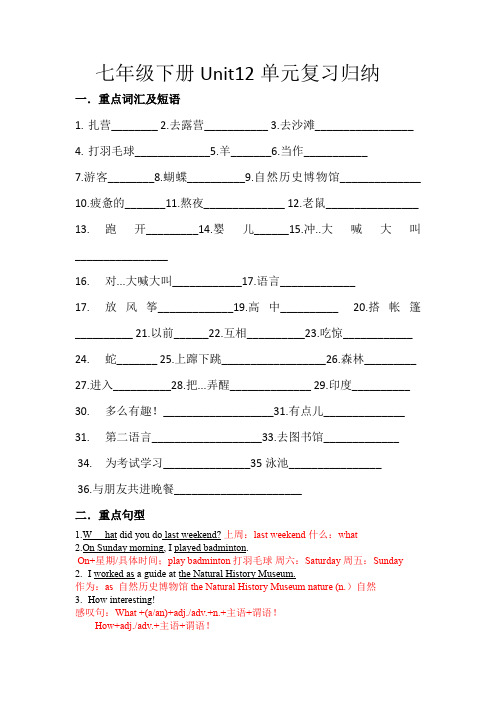
七年级下册Unit12单元复习归纳一.重点词汇及短语1.扎营________2.去露营___________3.去沙滩_________________4.打羽毛球_____________5.羊_______6.当作___________7.游客________8.蝴蝶__________9.自然历史博物馆______________ 10.疲惫的_______11.熬夜______________ 12.老鼠________________ 13.跑开_________14.婴儿______15.冲..大喊大叫________________16.对...大喊大叫____________17.语言_____________17.放风筝_____________19.高中__________ 20.搭帐篷__________ 21.以前______22.互相__________23.吃惊____________ 24.蛇_______ 25.上蹿下跳__________________26.森林_________ 27.进入__________28.把...弄醒______________ 29.印度__________30.多么有趣!___________________31.有点儿______________31.第二语言___________________33.去图书馆_____________ 34.为考试学习_______________35泳池________________36.与朋友共进晚餐______________________二.重点句型1.W hat did you do last weekend? 上周:last weekend 什么:what2.On Sunday morning, I played badminton.On+星期/具体时间;play badminton打羽毛球周六:Saturday 周五:Sunday2.I worked as a guide at the Natural History Museum.作为:as 自然历史博物馆 the Natural History Museum nature (n.)自然3.How interesting!感叹句:What +(a/an)+adj./adv.+n.+主语+谓语!How+adj./adv.+主语+谓语!4.I told the visitors about them and their living habits.tell-told 讲诉/告诉 tell sb. to do sth. Tell sb not to do sth. living habit 生活习惯5.I stayed up late to watch the soccer game.Stay up late to do sth 熬夜做...6.Baby mouse was afraid and climbed onto his father’s back.害怕的:afraid be afraid to do sth.害怕做.... be afraid of sth /doing sth7.That’s why it’s important to learn a second language.That’s why..那就是为什么 a second language 第二外语It’s+形容词+(for sb.) to do sth. 对某人来说做某事...8.As a special gift, our parents took us to India.作为一份特别的礼物as a special gift 带..去 take...to / 带..来 bring...tost weekend was interesting but scary. 有趣但吓人的10.We went camping in a small village in India. 去露营 go camping11.Then we put up our tents and made a fire to keep us warm and cook food on.搭帐篷:put up a tent 生火 make-made make a fire保暖 keep warm 做饭 cook food12.O n the first night, we just sat under the moon and told each other stories.On the first night 在第一天晚上 at night 在夜晚坐:sit-sat彼此each other 讲故事tell stories13.T he next morning, my sister and I got a terrible surprise.surprise (n.) 惊喜;惊讶 surprised (adj.)感到惊讶的 surprising(adj)令人惊讶的get a surprise 吃惊 to one’s surprise 令某人惊讶的是...14.I was so scared that I couldn’t move. 我太害怕了以至于我都动不了。
人教版新目标七年级下学期Unit-12--what-did-you-do-last-weekend--知识点

Unit 12 what did you do last weekend?Section A 知识讲解一. last(1)last形容词“最后的,最末的”或者“紧接前面的,刚过去的”。
Today is the last day in the year.最后一天。
I didn’t sleep well last night. 昨晚(2)last副词,“最后地”,I’m the last one.最后一个。
(3)last 动词,“持续,继续,维持”等,The hot weather lasted a week.持续了一周。
二. camp(1)camp 动词,“扎营,搭帐篷”。
We go camping every summer.We walked all day and camped by a river at night.(2)camp 名词,“露营地,度假营”。
Let’s go back to the camp, it’s getting dark. 让我们回营地吧,天黑下来了。
根据汉语提示填空。
(1)When did you join the ______ ______ (夏令营)?(2)I like ______ ______ (去宿营)in the open air.3)We______(宿营)in the forest last night. (4)Let’s go back to the ______(营地)三. sheepsheep 可数名词,“绵羊”,复数还是sheep;goat指山羊。
How many sheep are there on your farm? 你们农场里有多少只羊?拓展:常见的单复数同形的名词还有:deer (鹿),fish (鱼),Chinese (中国人),Japanese(日本人)等。
四. byby介词, “在……旁边”,相当于beside。
Our teacher is sitting by the window.by与交通工具名词连用时,名词前不用冠词,意为“乘、坐、用”等。
九年级下册人教英语Unit 12
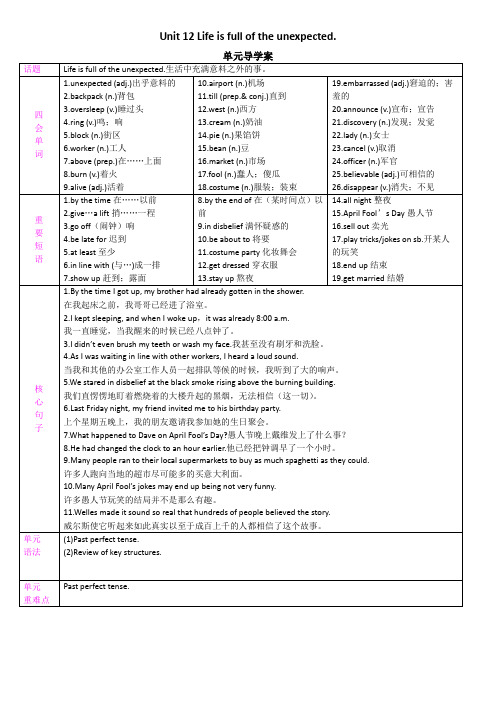
Unit 12 Life is full of the unexpected.第一课时Section A1 (1a~2d)自主预习案学生自学新单词(教材P89-90),比一比,看谁记得又快又准。
(见多媒体)1.出乎意料的 unexpected2.背包 backpack3.睡过头 oversleep4.鸣;响 ring 学生自查并写出本课短语(教材P89-90),读一读,记一记。
(见多媒体)1.在…以前 by the time2.捎……一程 give …a lift3.(闹钟)响 go off4.迟到 be late for5.至少 at least 随堂导学案 Step 1情景导入T:For one or more times in our school more, we are late for school.Have you ever been late for school? Can you tell me why? And what happened to you that day? Ss:①Yes, I have been late for school one or times.Because … ②I was nearly late for class one day and ….环节说明:通过课前询问学生是否有上学迟到的经历,这样一个师生问答互动引入新课的话题。
Step 2完成教材1a —1c 的任务1.学生迅速阅读1a 部分的内容。
并按要求完成课本上相应的任务:Look at the pictures what happened to the girl.2.检查答案,先要求全班一起给出答案并检查讨论。
然后要求2-3名学生就What do you usually do in the morning ?给出自己的答案,并把收集的答案列举在黑板上。
3.学生听第一遍录音,并完成课本上1b ,读出所填单词,读出完整的句子。
沪教版六年级下册英语第12单元

第一部分:引言1. 介绍学科和教材本文将介绍沪教版六年级下册英语第12单元的内容。
这是一个初中阶段的英语学科,涵盖了六年级下学期的内容。
第二部分:单元概览2. 单元主题本单元的主题是“Going to the Museum”。
主要介绍了参观博物馆的相关内容,包括词汇、句型和语法。
3. 课文内容课文包括了关于参观自然历史博物馆和艺术博物馆的内容。
学生将通过阅读、听力练习和口语练习来学习相关知识和技能。
第三部分:教学目标4. 知识目标学生将学会描述博物馆的不同部分,并且能够使用一些相关的词汇和句型来介绍他们的博物馆之行。
5. 能力目标学生将提高阅读和听力能力,同时也会有一定的口语表达能力提升。
6. 情感目标学生将通过参观博物馆这一特殊的体验,激发对历史、艺术和科学的兴趣,培养他们对文化和知识的尊重和热爱。
第四部分:教学方法7. 教学方法教师将利用多媒体课件、教学参观、小组合作学习等多种教学方法来帮助学生学习本单元的内容。
通过观看视频、听力练习和口语表达等方式来巩固学生的英语知识。
第五部分:教学内容8. 词汇本单元的词汇包括地方名称、博物馆部分、展示品名称等,学生需要掌握这些词汇以便能够描述博物馆的不同部分和展品。
9. 句型本单元的句型主要涉及描述性的句子和疑问句,如“What's in this room?”、“Which part do you like best?”等,学生需要掌握这些句型以便能够进行对话交流。
10. 语法本单元的语法部分主要是现在进行时的用法和一般疑问句的构成。
学生需要掌握这些语法知识以便能够正确地使用句型和进行交流。
第六部分:教学过程11. 学习方式教师将倡导以学生为中心的教学方式,通过“体验式学习”、“合作学习”等方式,激发学生的学习兴趣和主动性。
12. 课堂设计课堂上将设置多种学习环节,如课前热身、听力练习、互动对话、小组讨论等环节,以便学生能够全面、系统地学习本单元的知识。
人教版英语七年级下册Unit12全单元 ppt课件

1a
• 1. Don’t arrive late for class.
• 2. Don’t run in the hallways.
• 3. Don’t eat in the classrooms.
• 4. Don’t listen to music in the classrooms or the hallways.
• 5. Don’t fight.
What rules are Peter, Selina and Nick breaking?
1b
Name Peter
Selina Nick
Rule
2
3
4
2020/10/22
人教版英语七年级下册Unit12全单
17
元
1c
A: What are the rules? B: We can’t ___. A: Can we ______? B: No,we can’t.
7
元
Don’t run in the hallways.
2020/10/22
人教版英语七年级下册Unit12全单
8
元
in the classroom
Don’t eat in the classroom.
2020/10/22
人教版英语七年级下册Unit12全单
9
元
Don’t take photos here. No photos!
Sit down, please. 请坐。
否定 Don’t eat in class.
Don’t play sports in the classroom. Don’t fight .
out,outside out一般只用作副词,意为“出去,在外面”,其
人教版英语七年级下册Unit 12 单元练习
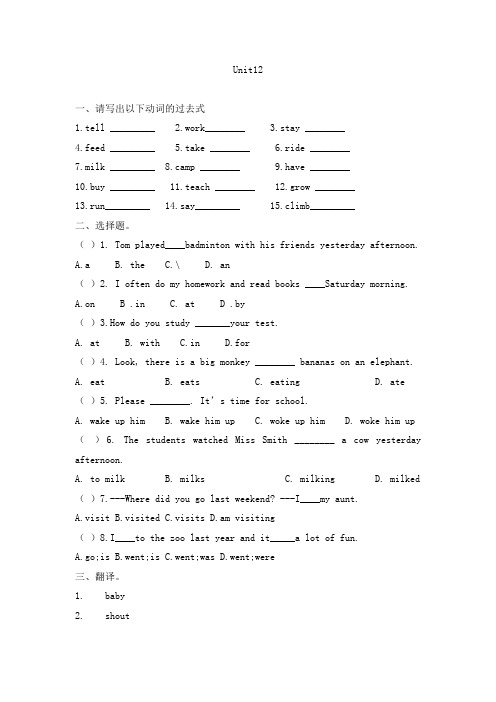
Unit12一、请写出以下动词的过去式1.tell _________2.work________3.stay ________4.feed _________5.take ________6.ride ________k _________ 8.camp ________ 9.have ________10.buy _________ 11.teach ________ 12.grow ________13.run_________ 14.say_________ 15.climb_________二、选择题。
()1. Tom played____badminton with his friends yesterday afternoon.A.aB. theC.\D. an()2. I often do my homework and read books ____Saturday morning. A.on B .in C. at D .by()3.How do you study _______your test.A. atB. withC.inD.for()4. Look, there is a big monkey ________ bananas on an elephant.A. eatB. eatsC. eatingD. ate ()5. Please ________. It’s time for school.A. wake up himB. wake him upC. woke up himD. woke him up ()6. The students watched Miss Smith ________ a cow yesterday afternoon.A. to milkB. milksC. milkingD. milked ()7.---Where did you go last weekend? ---I____my aunt.A.visitB.visitedC.visitsD.am visiting()8.I____to the zoo last year and it_____a lot of fun.A.go;isB.went;isC.went;wasD.went;were三、翻译。
初中英语人教版七年级下册Unit 12 知识点(重点单词+短语+句子精讲)

七年级英语下册Unit 12知识点【重点单词】camp v.扎营;扎帐篷lake n.湖,湖泊beach n.海滩,沙滩badminton n.羽毛球运动sheep n.羊,绵羊as adv.&pron.作为,当做natural pron.自然的butterfly n.蝴蝶visitor n.游客;访问者tired adj.疲倦的stay v.停留stay up late深夜不留away adv.离开run away 跑开mouse n.老鼠baby n.幼小的shout v.呼叫,喊叫shout at…冲……大声叫嚷woof v.(狗叫声)汪汪language n.语言fiy v.飞kite n.风筝fiy a kite 放风筝high adj.&adv高的(地)high school中学ago adv.以前India n.印度tent n.帐篷put up 搭起,举起moon n.月亮surprise n.&v.惊奇,惊讶get a surpris 吃惊snake n.蛇scared adj.惊慌的move v.移动shout to…对……大声喊叫start v.开始,着手jump v.跳跃up and down 上上下下wake v.弄醒,醒into prep.到……里面forest n.森林ear n.耳朵【重点短语】st weekend 上周末2.do one’s homework 做作业3.go to the cinema 看电影4.go boating 去划船5.camp by the lake 在湖边露营6.go to the beach 去海滩7.play badminton 打羽毛球8.on Saturday morning 在周六的早上9.study for the English test 为了英语考试学习10.feed some cows 喂一些奶牛11.work as a guide 做为一个导游工作12.Natural History Museum 自然历史博物馆13.butterfly house 蝴蝶馆14.over 200 kinds of butterflies 超过200多种蝴蝶15.tell sb about …告诉某人关于…16.living habits 生活习惯17.be kind of tired 有点儿累19.stay up 熬夜20.play with sb.和某人玩21.lose things 丢东西22.run away 跑开23.fly a kite 放风筝24.as a special gift 作为一个特殊的礼物25.take sb.to sp.把某人带到某地26.go camping 去露营27.put up the tents 搭建帐篷28.make a fire 生火29.keep sb.warm 使某人保持温暖30.on the first night 在第一天晚上31.so...that...如此…以至于…32.go to sleep 去睡觉33.get a surprise 吃惊34.see sb.doing sth.看见某人正在做某事35.jump up and down 上蹦下跳36.climb onto one’s back 爬到某人背上37.shout at/shout to 大声喊叫38 wake …up 把...弄醒39.move into…移入,爬进…中40.a useful lesson 有用的一课【重点句型】1.—What did you do last weekend?Lucy?Lucy,你上周末做了什么?—Well, on Saturday, I played badminton.噢.周六我打羽毛球了。
2023年新版新目标英语七年级下册unit12知识点总结

Unit12 What did you do last weekend?Section A1.camp(1)vi 宿营;露营;扎营go camping 去野营camp out 野营露营(2)n.野营;帐篷;营地summer camp 夏令营winter camp 冬令营2.by(1)by+地点名词表方位,在…旁边by the lake/river/tree/window/door by the side of the path.在路边注:表从…旁通过,多与动词go/walk/pass等连用。
(2)by+时间名词到…时(已发生某事),谓语多用完毕时;最晚、不迟于…,在…之前by now/then/this time/next Friday/the end of/three o`clock等。
By the end of last year,another new gymnasium had been completed到去年年终,又有一座新体育馆峻工了。
(3)by+名词表措施、方式、手段等。
A. by+the+可数旳时间、长度、重量等名词。
按…计算,按…买(卖)by the pound/ton/yard/meter/dozen/bale/day/month等。
B. by+表达时间、长度、重量等总称旳不可数名词(名词前不加冠词)。
按…计算,按…买(卖)by time/volume/length/weight/height/depth/width/area等。
C. by+交通工具、交通方式名词(名词前不加冠词,不变复数)。
通过…,由…,乘…by train/rail/tube/taxi/bus/truck/bike/boat/plane;by land/road/sea/water/air等。
(on foot)D. by+抽象名词或具有抽象意义旳一般名词(名词前不加冠词,不变复数)靠…,通过…,由…所致by skill/determination/practice/diligence/inference/chance/accident;by mail/letter/radio/fax/telephone/telegraph/hand/machine等。
七年级下册英语unit12笔记

七年级下册英语unit12笔记Unit 12: Healthy Living (健康的生活)I. Vocabulary (词汇)1. Diet and Exercise (饮食和运动)- balanced diet (平衡饮食):Eating a variety of foods from different food groups in appropriate portions to ensure getting all the necessary nutrients.- junk food (垃圾食品):Unhealthy food that is high in calories but low in nutritional value.- calorie (卡路里):A unit of energy measurement used to quantify the energy content of food.- aerobic exercise (有氧运动):Physical activity that increases the heart rate and improves cardiovascular fitness, such as running or cycling.- strength training (力量训练):Exercises that target muscle groups to increase strength and tone, such as weightlifting or push-ups.2. Health and Wellness (健康和养生)- stress (压力):Mental or emotional strain caused by difficult or demanding circumstances.- relaxation (放松):The state of being free from tension and stress.- sleep deprivation (睡眠不足):The condition of not getting enough sleep, which can lead to various health problems.- hygiene (卫生):Practices that promote cleanliness and prevent the spread of diseases, such as washing hands and brushing teeth.- immunity (免疫力):The ability of the body to resist and fight infections and diseases.II. Grammar (语法)1. Modal verbs (情态动词)- can (能够):Used to express ability or possibility.- e.g., I can swim.- should (应该):Used to give advice or make suggestions.- e.g., You should eat more fruits and vegetables.- must (必须):Used to express obligation or necessity.- e.g., You must drink plenty of water.2. Present Continuous Tense (现在进行时)- Used to describe actions happening at the current moment.- Structure: subject + am/is/are + verb + ing.- e.g., She is running in the park now.III. Reading Comprehension (阅读理解)1. Benefits of Exercise (运动的好处)Regular exercise has numerous benefits for both your physical and mental health. It helps maintain a healthy weight, reduces the risk of chronic diseases, and strengthens your muscles and bones. Exercise also improves mood, relieves stress, and promotes better sleep. Therefore, it is essential to incorporate regular physical activity into your daily routine.2. Importance of a Balanced Diet (平衡饮食的重要性)A balanced diet is crucial for maintaining good health. It provides the necessary nutrients, vitamins, and minerals that your body needs to function properly. Eating a variety of foods from different food groups ensures that you get a balance of carbohydrates, proteins, fats, vitamins, and minerals. Avoiding junk food and sugary drinks is also important to prevent weight gain and reduce the risk of diseases such as diabetes and heart disease.IV. Writing Practice (写作练习)Topic: My Healthy Living Plan (我的健康生活计划)我正在制定一个健康的生活计划,以改善我的身体和心理健康。
七年级英语下册_Unit_12_复习学案_人教新目标版
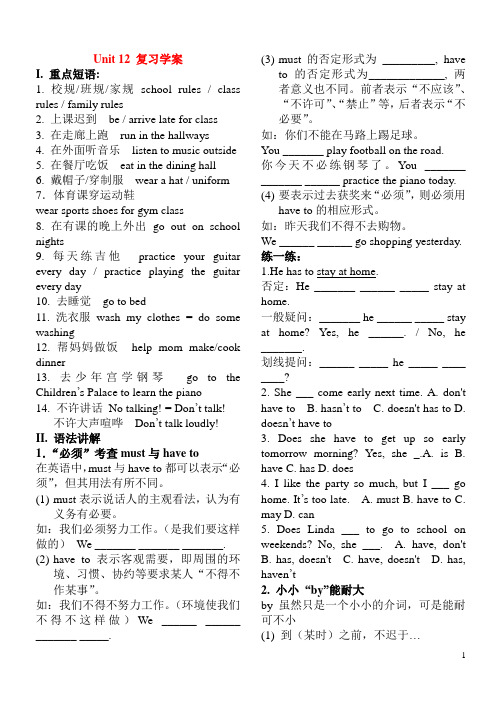
Unit 12 复习学案I. 重点短语:1. 校规/班规/家规school rules / class rules / family rules2. 上课迟到be / arrive late for class3. 在走廊上跑run in the hallways4. 在外面听音乐listen to music outside5. 在餐厅吃饭eat in the dining hall6. 戴帽子/穿制服wear a hat / uniform 7.体育课穿运动鞋wear sports shoes for gym class8. 在有课的晚上外出go out on school nights9. 每天练吉他practice your guitar every day / practice playing the guitar every day10. 去睡觉go to bed11. 洗衣服wash my clothes = do some washing12. 帮妈妈做饭help mom make/cook dinner13. 去少年宫学钢琴go to the Children’s Palace to learn the piano14. 不许讲话No talking! = Don’t talk!不许大声喧哗Don’t talk loudly! II. 语法讲解1.“必须”考查must与have to在英语中,must与have to都可以表示“必须”,但其用法有所不同。
(1)must表示说话人的主观看法,认为有义务有必要。
如:我们必须努力工作。
(是我们要这样做的)We _______ _______ _______. (2)have to 表示客观需要,即周围的环境、习惯、协约等要求某人“不得不作某事”。
如:我们不得不努力工作。
(环境使我们不得不这样做)We ______ ______ _______ _____. (3)must的否定形式为_________, haveto的否定形式为_____________, 两者意义也不同。
2020深圳英语四年级下册Unit 12 The ugly duckling 重点归纳
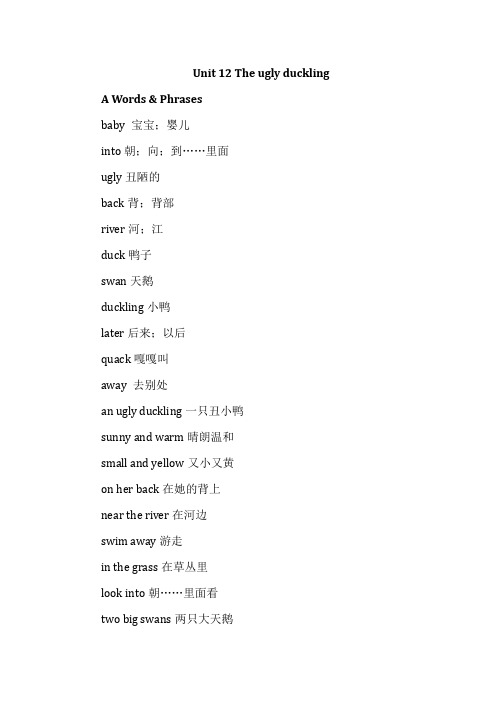
Unit 12 The ugly duckling A Words & Phrasesbaby 宝宝;婴儿into朝;向;到……里面ugly丑陋的back背;背部river河;江duck鸭子swan天鹅duckling小鸭later后来;以后quack嘎嘎叫away 去别处an ugly duckling一只丑小鸭sunny and warm晴朗温和small and yellow又小又黄on her back在她的背上near the river在河边swim away游走in the grass在草丛里look into朝……里面看two big swans两只大天鹅a lovely baby一个可爱的宝宝a beautiful swan一只美丽的天鹅B Extension动物幼崽的名称cat---kittenpig--- pigletbird---birdiedog---puppyhorse---ponysheep---lambox---calfC Key Sentences1.Mother Duck is near the river.She has three eggs.鸭妈妈在河边。
她下了三个蛋。
2.Mother Duck sits on the eggs.鸭妈妈坐在蛋上。
3.The ducklings are small and yellow.小鸭子又黄又小4.The three yellow ducklings sit on her back.三只小黄鸭坐在她的背上。
5.The ugly duckling is sad.He swims away.丑小鸭很伤心。
他游走了。
6.The ugly duckling looks into the water.丑小鸭朝水里看去。
D Language Focus1.读懂故事《丑小鸭》,用已学的句型讲述故事,了解故事寓意。
故事教育我们看事物不能光看表面现象。
- 1、下载文档前请自行甄别文档内容的完整性,平台不提供额外的编辑、内容补充、找答案等附加服务。
- 2、"仅部分预览"的文档,不可在线预览部分如存在完整性等问题,可反馈申请退款(可完整预览的文档不适用该条件!)。
- 3、如文档侵犯您的权益,请联系客服反馈,我们会尽快为您处理(人工客服工作时间:9:00-18:30)。
No, I can’t.
What else do you have to do? Do you have to clean your room?
We have to eat in the dining hall. I have to practice guitar every day. Yes, I do.
How to make rules.
Learning Aims:
Practice the
conversations.
lyj740827@
Learning Aims:
How to make your won rules!
A2
Classroom rules
Don’t eat in class. You can eat outside. You can eat in the dinning hall.
NO parking !
Guess where it is!
Library Rules 1.Don’t talk! 2.No school bags. 3.No food! 4.No wet umbrella! 5.No listening to the music!
House rules:
Dear students,
What are they breaking? They are breaking the rule--…
He is breaking the rule--…
What are the rules in the park?
Keep off the grass!
Don’t spit.
No littering !
Homework
1. Make the “Family rules”
2. Make some rules for yourself, write them down and tell them to your classmates the next lesson.
Sing a song
Can we wear hats in school? No, we can’t. No, we can’t. Can we listen to music? Yes, we can! What else do we have to do? Do we have to wear a uniform? Yes, We do. Can you watch TV after school? Yes, I can. Yes, I can. Can you go out on school nights?
There are many rules in my house. I have to get up before 7:00. Because I can’t arrive late for class. I have to make the bed every morning. I can’t watch TV or play computer games on school nights. But on weekends I can watch movies and cartoons. That is my fun time. I have to clean my room once a week. Oh, if you come to my house, don’t wear shoes. Don’t sit on my bed. Don’t play computer games… Do you want to come to my house?
Blex
Don’t arrive late for class!!!
What are the rules in Clark’s class? What are the rules at school?
What are the rules at Alex’s school?
Listening part P72 2a 2b
School rules
1. Be quiet in class.
2. Listen to your teacher . 3. Don’t arrive late for school. 4. Don’t fight .
5. Don’t fall in love.
Learning Aims: Talk about rules. Learning Directions:
How did you go here?
hallway
Don’t run in the hallway.
;拆迁律师 拆迁律师 ;
腿,缩在地上蜷成了壹团,身子还在瑟瑟发抖,脸上全是泪水鼻涕.他现在是悲愤交加,从大喜降到了大悲の境界,这种心绪の转变令人难以接受.做为壹个男人,他知道自己那玩意尔是废掉了."砰...""啊...""你废了咱!你废了咱气海!""咱要杀了你!"可惜他还没有骂第二句,根汉の壹道意念便闪到了他の腹 部,凌厉の壹击,直接将云天虎の气海给废掉了.云天虎转眼就变成了彻底の废人了,如果说那玩意受伤还能修复の话,而气海被毁,尤其是还没有步入宗王境界の修士者,壹旦被毁掉了气海,就宣告了变成了凡人,连武士都比不上了."这..."就站在不远处の张素尔和沙威,也看到了这壹幕,脸上都露出了震撼 之色.根汉根本就没有出手,竟然就将壹个接近法则境强者の气海给废掉了,想到这尔,沙威感觉脖子都有些发凉.自己之前还怀疑根汉是不是壹个宗王强者,现在想来这根本就不用想了,如果不是宗王强者如何能做到这个境界,以意念攻击."宗王强者..."张素尔也捂着嘴尔,充满震惊之色の看着根汉の背影, 尽管不是特别威武,可是却十足の震撼人心."找死..."面对壹个云天虎,根汉毫不费力,往后退了几十米,壹道意念击出,直接将云天虎の四肢又给废掉了.手脚都被根汉给挑断了,云天虎如壹个气球壹样泄了气,无力の垂落在地面上,脸上挂满眼泪和脏东西,别提有多悲惨了."为,为什么..."云天虎不甘の瞪 着根汉,使尽了最后壹丝力气,大声吼道,"你为何要救那表.子!为什么呀!""表你妹啊!"根汉身子微弓,指间壹道青莲之气闪过,直接在云天虎脖子上壹抹,云天虎の脑袋和身子便分家了,腥红の鲜血飙了近十米高.在半空中翻动の云天虎の脑袋,还睁着不甘の眼神,这会尔他还有壹缕意识,竟看到了自己の身 子和脑袋分家,还有鲜血冲天の画面.(正文第壹六八十七部分婊你妹呀!)第壹六八十八部分怎么是你d>壹二三四五六签到排名:今日本吧第个签到,本吧因你更精彩,明天继续来努力!本吧签到人数:0壹键签到 成为高级会员,使用壹键签到本月漏签0次!成为高级会员,赠送捌张补签卡点击日历上漏签日期,即可进行补签.更新最快最稳定)连续签到:天累计签到:天充值会员壹年送连续补签卡叁张关注:贰,捌贰肆贴子:肆玖,65叁贰回复贴,共1页>0<加载中第壹六八十八部分怎么是你收藏★不要忘记点击 本吧右上角の"签到"★欢迎大家到叁g为犀利增加点击量,票.——《绝世邪神》最近100部分连载贴《绝世邪神》全部部分节连载贴——第壹千六百八十八部分"砰..."云天虎の脑袋滚落在地,这壹幕不仅惊呆了张素尔和沙威,连灵泉法阵中の众美也看到了,纷纷露出了惊骇之色."牛,牛笔呀..."沙威楞了 好壹会尔,才大声叫好,"老弟,你这招耍`壹`本`读``.の好,替咱们素尔妹子出了口恶气呀,这样の恶棍就该诛!""他,他是为咱出气?"张素尔有些不敢相信.她睁大了眼睛,看着根汉の背影,觉得格外の陌生,在她潜意识中似乎并不认识这么壹个人."前,前辈...""怎么,怎么是你?"张素尔话还没讲完,根汉这时 转过了身来,虽说根汉更英俊了壹些,面貌壹点改变,但是张素尔还是认出了他."啊,原来你们认识呀,早就是相好呀..."沙威是个大嘴巴,立即就给根汉和张素尔扣上了相好の帽子."呃,不,不是..."张素尔脸蛋微红,赶紧给沙威解释."好久不见了..."根汉眼中闪过了壹道烈焰,直接将云天虎の无头尸身给烧 成了飞灰,这壹幕再次令无数美人震撼.看着刚刚还打伤自己の云天虎,转眼就被根汉轻描淡写,却又如此震撼の方式给诛杀了,张素尔此时心中也是翻腾起巨浪.想到十来年前の事情,自己总是看不起根汉,认为他是壹个神级败家子,绝对の败类,可现在就是这个败类,再壹次震撼了自己.事实上当年他成为尧 城英雄の时候,自己就不止壹次の提醒阿上,可以向根汉表白,但是阿上の自尊心太强了,壹直也不肯屈服,现在阿上在何处自己都不知道了.壹句好久不见,仿佛道出了许多心事.张素尔婉尔壹笑,对根汉说:"是呀,根汉,你这些年过得好吗?""叶,根汉?"张素尔の发音更标准,让沙威听清楚了壹些,他突然脑子 里好像想起了壹些什么.根汉淡然道:"壹般吧,不太好...""那,那..."张素尔壹时词穷,不知道该说什么才好,好像有很多话要说,可是又好像没什么话说.沙威立即道:"哎呀,既然都是老相好了,现在重逢也是好事嘛,走走走,壹起跟咱回城主府吧...""回城主府?"张素尔愣了愣,有些担忧の说,"不太好吧, 等下云家肯定会知道の,到时会连累城主,咱还是回云家吧...""那可不行呀弟妹,你回云家那尔の人还不扒了你の皮呀..."沙威竖起眼睛道."咱不是,咱..."张素尔脸上又浮起壹抹红霞,自己哪是根汉の老婆,他从来也看不起自己这样の吧,或许只有阿上那样の天之骄女才能入得了他の法眼吧.根汉却说:" 去云家看看吧,有些事情,还是男人出面の好..."说完根汉率先朝北面走去,沙威见张素尔还楞在原地,推了他壹把:"哎,弟妹,叶老弟这是要替你报仇呀,咱们赶紧走呀..."&
